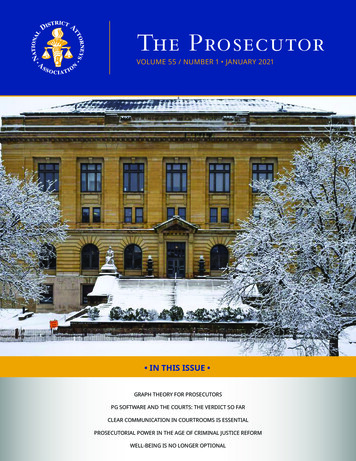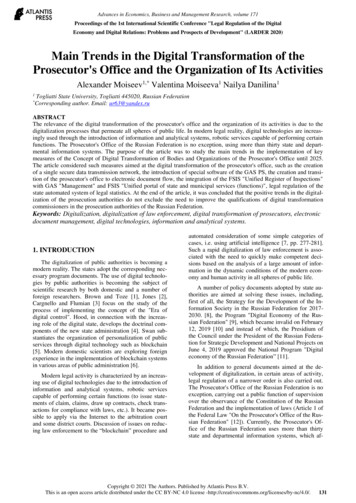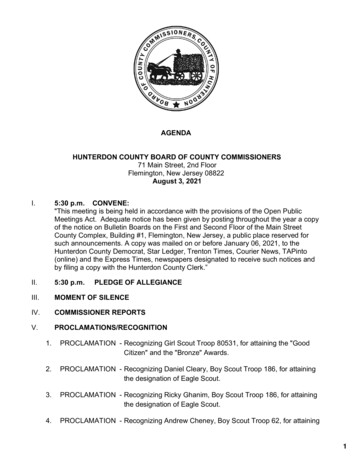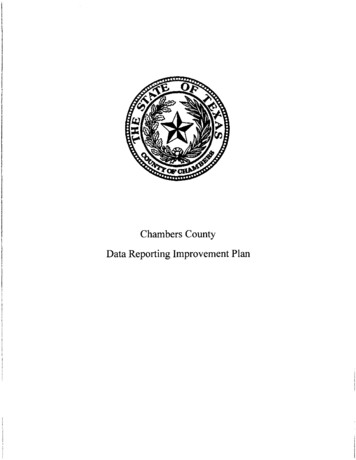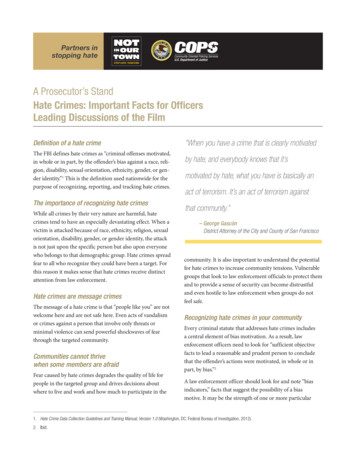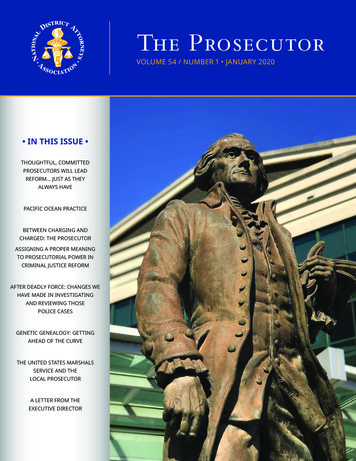
Transcription
The ProsecutorVOLUME 54 / NUMBER 1 JANUARY 2020 IN THIS ISSUE THOUGHTFUL, COMMITTEDPROSECUTORS WILL LEADREFORM. JUST AS THEYALWAYS HAVEPACIFIC OCEAN PRACTICEBETWEEN CHARGING ANDCHARGED: THE PROSECUTORASSIGNING A PROPER MEANINGTO PROSECUTORIAL POWER INCRIMINAL JUSTICE REFORMAFTER DEADLY FORCE: CHANGES WEHAVE MADE IN INVESTIGATINGAND REVIEWING THOSEPOLICE CASESGENETIC GENEALOGY: GETTINGAHEAD OF THE CURVETHE UNITED STATES MARSHALSSERVICE AND THELOCAL PROSECUTORA LETTER FROM THEEXECUTIVE DIRECTOR
Photo Credit: Adam LarkeyPhoto Credit: Scott Dressell MartinJOIN US!SUMMER SUMMIT 2020Denver, COThe Curtis Hotel July 20–21, 2020
The ProsecutoraExecutive DirectorNelson O. Bunn, Jr.Publication04nbunn@ndaajustice.orgChief Operating OfficerChristine MicaAgnita Kote0712Reform. Just as They Always HavePacific Ocean PracticeBetween Charging and Charged: The ProsecutorAssigning a Proper Meaning to ProsecutorialPower in Criminal Justice ReformBY WILLIAM P. RING, M.S. ED., J.DPolicy, Government &Frank RussoThoughtful, Committed Prosecutors Will LeadBY JOHN BRADLEYakote@ndaajustice.orgLegislative AffairsNational D istrict A ttorneys AssociationBY DUFFIE STONEcmica@ndaajustice.orgDirector of Financeof the19Meet a NDAA Member20Erin CarrCierra JenkinsCandace Mosley23kbrowning@ndaajustice.orgNational Traffic Law CenterJoanne Thomkajthomka@ndaajustice.orgGenetic Genealogy: Getting Ahead of the CurveBY BRYAN L. PORTER26cmosley@ndaajustice.orgKristi BrowningMade in Investigating and ReviewingBY MIKE FREEMANcjenkins@ndaajustice.orgNational CoursesAfter Deadly Force: Changes We HaveThose Police Casesecarr@ndaajustice.orgConferences30The United States Marshals Service andexpressed in the articlesin this publication arethose of the authorsand do not necessarilyrepresent the views ofthe National DistrictAttorneys Association.The Prosecutor ispublished by NDAA for itsmembers as part of theirThe Prosecutor encouragesits readers to submitarticles of interest toprosecutors for possiblepublication in themagazine. Sendarticles to Nelson Bunn,nbunn@ndaajustice.orgA Letter from the Executive Directorsubscriptions, undeliveredBY NELSON O. BUNN, JR.32ArticlesQuestions or ConcernsMeet the NDAA TeamProgram DirectFor information aboutcopies and changesof address, as well asadvertising rates,please email Erin Carr,ecarr@ndaajustice.orgNDAA1400 Crystal Drive, Suite ociation. ViewsBY LORI MCPHERSONNelson O. Bunn, Jr.Hudson StudioDistrict Attorneysthe Local ProsecutorEditor of The ProsecutorMagazine Design0027-6383, Nationalmember benefits.frusso@ndaajustice.orgMembership & MarketingThe Prosecutor, ISS No.About the CoverThe statute of Thomas Jefferson, namesake for Jefferson Parish, is setoutside the Jefferson Parish Government Center in Gretna, LA, whichincludes the DA's Office‚ the red-brick building in the background.Arlington, VA 22202Phone 703.549.9222Fax 703.836.3195Visit NDAA at ndaa.org
NDAA Leadership 2019–2020SONIA PAQUETDeputy Chief ProsecutorQuebec, QCMARC BENNETTDistrict AttorneyWichita, KSLORI DIGIOSIADeputy Commonwealth’s AttorneyStafford,VANANCY PARRCommonwealth’s AttorneyChesapeake,VABRAD BERRYDistrict AttorneyMcMinnville, ORJOE EARLYDistrict AttorneyWorcester, MADUFFIE STONESolicitorBluffton, SCSHERRI BEVAN WALSHProsecuting AttorneyAkron, OHDAN ERRAMOUSPECounty AttorneyGreen River, WYGREG TOTTENDistrict AttorneyVentura, CAJONATHAN BLODGETTDistrict AttorneySalem, MADAVID ESCAMILLACounty AttorneyAustin, TXAMY WEIRICHDistrict Attorney GeneralMemphis, TNJOHN BORDProsecuting AttorneyGrafton, WVBILL FITZPATRICKDistrict AttorneySyracuse, NYBILLY WESTDistrict AttorneyFayetteville, NCDAVID BROWNChief Deputy County AttorneyMinneapolis, MNJOHN FLYNNDistrict AttorneyErie, NYBOARD OF DIRECTORSBIRCH BURDICKState’s AttorneyFargo, NDMIKE FREEMANCounty AttorneyMinneapolis, MNBRADLEY BURGETDistrict AttorneyVidalia, LABILL FULBRIGHTCounty AttorneyHamilton, MTDAVE ARONBERGState’s AttorneyWest Palm Beach, FLBILL CERVONEState’s AttorneyGainesville, FLHENRY GARZADistrict AttorneyBelton, TXMARY ASHLEYAssistant District AttorneySan Bernardino, CAJANE CHAMBERSCommonwealth’s AttorneyWilliamsburg,VASIM GILLDistrict AttorneySalt Lake City, UTJIM BACKSTROMCounty AttorneyHastings, MNDARCEL CLARKDistrict AttorneyBronx, NYGAIL HARDYState’s AttorneyHartford, CTGREG BANKSProsecuting AttorneyCoupeville, WAKEVIN COCKRELLMontgomery County AttorneyMt. Sterling, KYMEG HEAPDistrict AttorneySavannah, GAMEG HEAPDistrict AttorneySavannah, GAJULIA BATESProsecuting AttorneyToledo, OHTIM CRUZDistrict AttorneyBrockton, MAMAT HECKProsecuting AttorneyDayton, OHJOE MCMAHONState’s AttorneySaint Charles, ILKEVIN BAXTERProsecuting AttorneySandusky, OHRODNEY CUMMINGSProsecuting AttorneyAnderson, INSCOTT HIXSONChief Deputy SolicitorConway, SCELIZABETH ORTIZAPAAC Executive DirectorPhoenix, AZJOHN BELTONDistrict AttorneyRuston, LAJOSEPH DALLAIREDistrict AttorneyFairbanks, AKJIM HUGHESState’s AttorneySaint Albans,VTOFFICERSDUFFIE STONEPresidentBluffton, SCNANCY PARRPresident-ElectChesapeake,VAJONATHAN BLODGETTChairman of the BoardSalem, MABILLY WESTTreasurerFayetteville, NCEXECUTIVE COMMITTEEMARY ASHLEYAssistant District AttorneySan Bernardino, CABRAD BERRYDistrict AttorneyMcMinnville, ORJONATHAN BLODGETTDistrict AttorneySalem, MAKEVIN COCKRELLMontgomery County AttorneyMt. Sterling, KYBILL FITZPATRICKDistrict AttorneySyracuse, NYJOHN FLYNNDistrict AttorneyErie, NYMIKE FREEMANCounty AttorneyMinneapolis, MN2 JANUARY 2020DEB ARMANINIFirst Assistant ProsecutingAttorneyDayton, OH
LA BRAVIA JENKINSCommonwealth’s AttorneyFredericksburg,VAMORRIS MURRAYProsecuting AttorneyDefiance, OHDEWAYNE RICHARDSONDistrict AttorneyGreenville, MSSEAN THORNTONDeputy SolicitorBluffton, SCRUSSELL JOHNSONDistrict Attorney GeneralKingston, TNJIM NAGLEProsecuting AttorneyWalla Walla, WAWILLIAM RINGCounty AttorneyFlagstaff, AZGREG TOTTENDistrict AttorneyVentura, CAKEITH KANESHIROProsecuting AttorneyHonolulu, HIMIKE O’DELLDistrict AttorneyFort Payne, ALMICHAEL ROURKEDistrict AttorneyGreeley, COHENRY VALDEZAODA DirectorSanta Fe, NMDON KLEINECounty AttorneyOmaha, NEMICHAEL O’KEEFEDistrict AttorneyBarnstable, MAJONATHAN SAHRBECKDistrict AttorneyPortland, MECY VANCEDistrict AttorneyNew York, NYJACKIE LACEYDistrict AttorneyLos Angeles, CAERIC OLSENCommonwealth’s AttorneyStafford,VAJOHN SARCONECounty AttorneyDes Moines, IAMARK VARGOState’s AttorneyRapid City, SDBARBARA LAWALLCounty AttorneyTucson, AZPETE ORPUTCounty AttorneyStillwater, MNANNE MARIE SCHUBERTDistrict AttorneySacramento, CAJENNIFER WEBB-MCRAECumberland County ProsecutorBridgeton, NJDAVID LEYTONProsecuting AttorneyFlint, MIELIZABETH ORTIZAPAAC Executive DirectorPhoenix, AZBRYCE SHIELDSDistrict AttorneyLovelock, NVAMY WEIRICHDistrict Attorney GeneralMemphis, TNGRANT LOEBSProsecuting AttorneyTwin Falls, IDMARK OSTREMOlmsted County AttorneyRochester, MNJOHN SINQUEFIELDSenior Counsel LDOJBaton Rouge, LABILLY WESTDistrict AttorneyFayetteville, NCDIANNA LUCEDistrict AttorneyCarlsbad, NMSONIA PAQUETDeputy Chief ProsecutorQuebec, QCCHARLIE SMITHState’s AttorneyFrederick, MDTHERESA WETZSTEONDistrict AttorneyWausau, WILEMUEL MARTINEZDistrict AttorneyBernalillo, NMNANCY PARRCommonwealth’s AttorneyChesapeake,VADAVID SOARESDistrict AttorneyAlbany, NYMATT WILBERCounty AttorneyCouncil Bluffs, IAGREG MASHBURNDistrict AttorneyNorman, OKWORTH PASCHALAssistant District AttorneyFayetteville, NCMARK SORSAIAProsecuting AttorneyWinfield, WVSCARLETT WILSONSolicitorCharleston, SCBETH MCCANNDistrict AttorneyDenver, COSCOTT PATTERSONState’s AttorneyEaston, MDKIMBERLY SPAHOSChief Resource ProsecutorCary, NCERIC ZAHNDProsecuting AttorneyPlatte City, MOJOE MCMAHONState’s AttorneySaint Charles, ILLEE POLIKOVCounty AttorneyPapillion, NESUMMER STEPHANDistrict AttorneySan Diego, CAMIKE MOOREState’s AttorneyHuron, SDBRYAN PORTERCommonwealth’s AttorneyAlexandria,VADUFFIE STONESolicitorBluffton, SCRAY MORROGHCommonwealth’s AttorneyFairfax,VALOU ANNA RED CORNCommonwealth’s AttorneyLexington, KYTOM TATUMProsecuting AttorneyDanville, ARTHE PROSECUTOR 3
Thoughtful, Committed Prosecutors WillLead Reform. Just as They Always HaveBy DUFFIE STONENDAA President, 14th Judicial Circuit Solicitor (SC)“Never doubt that a small group of thoughtful, committedcitizens can change the world; indeed, it’s the only thing thatever has.” This quotation is usually attributed to the greatAmerican anthropologist Margaret Mead, and it is one of myfavorites. Consider its message in the context of prosecutors,a small group of thoughtful, committed citizens who can— and do — change the world. In the past 35 years, everymajor innovation, improvement or reform measure in thecriminal justice system has had a prosecutor at the forefront.Prosecutors are in a unique, front-line position to observeproblems in the criminal justice system, which makes usideal innovators to improve the experience of victims. Forexample, District Attorney Bud Cramer of Huntsville, AL,set out in 1989 to change the way child sexual assault caseswere handled.Cramer was troubled that victims were forced to repeattheir stories — and thereby revisit their trauma — over andover again. Child victims were going to one location fora forensic interview, another for a sexual assault exam andyet another for counseling. Law enforcement, social services,child protective services and counseling were available, butthey were dispersed across Cramer’s jurisdiction. He decidedthey needed a central, child-friendly location to makethese services more accessible, less time-consuming and lessstressful.So Cramer, along with a small group of thoughtful,committed citizens created the first child advocacy center.Today there are more than 1,000 child advocacy centersin our country — at least one in every state — and in 33other countries, too. A thoughtful prosecutor recognized aproblem, resolved to fix it, then did.Similarly, City Attorney Casey Gwinn, working with the SanDiego District Attorney’s Office in 2002, was an innovatoron behalf of domestic-violence victims.For many of our jurisdictions, domestic violence is a majorcrime problem, primarily affecting women. According tothe NDAA Women Prosecutors Section white paper on the4 JANUARY 2020topic, 85 percent of victims are female. Those unaffected bythis crime sometimes struggle to understand it. Stories ofwomen abused repeatedly and brutally by their partners areoften met with, “Why doesn’t she just leave?”As prosecutors who work and conduct research in thisfield, we know leaving is a process, not an event. Victimsof domestic abuse need financial and emotional support toremove themselves from harm’s way. They need counselingand emergency shelter. Even back in 2002, all of these serviceswere available but not user-friendly or streamlined. Victimswere forced to repeat their horrific stories over and over.So Gwinn, along with a few other thoughtful, committedcitizens, formed the first family justice center and brought allthe services a battered woman would need — prosecution,law enforcement, counseling and other support resources —under a single roof. Today there are more than 100 of thesecenters throughout the country.Prosecutors have not only improved thecriminal justice system for victims. Wehave done it for defendants, as well.Prosecutors have not only improved the criminal justicesystem for victims. We have done it for defendants, as well.Memphis, TN District Attorney Amy Weirich received aremarkable letter congratulating her on her 2014 election.The writer was actually a prisoner who made this astuteobservation: Some offenders embrace anti-social behavior;others struggle with it. The challenge to prosecutors is toknow the difference.Back in 1989, a small group of thoughtful, committed citizens— including then-District Attorney Janet Reno of DadeCounty, FL — had already figured this out. South Floridawas an early battleground for a new illegal drug, “crack,”which was quickly spreading across the nation and causing
The Prosecutoran epidemic crime problem. Incarceration was the go-topublic policy response, but it clogged criminal justice systemsand overcrowded jails and prisons. Prosecutors saw the needfor drug treatment incentives and rehabilitation programsto reduce recidivism and increase offender accountability.Drug court was born.This successful and innovative concepthas been further expanded to the creation of mental healthcourts and even courts specifically for service veterans,pairing criminal justice with social services they need.More than ever, prosecutors need to recognize and highlightall the improvements we have made in the criminal justicesystem. If not, we risk being defined by a false narrative thatasserts we do not care, that claims our only interest is inlocking up as many people as possible, and that the solutionto societal ills is more so-called “progressive” prosecutors.A reporter from the Washington Post recently called meand asked, “What are your thoughts about the new waveof progressive prosecutors?” I told him that virtually everyprosecutor I know has been a progressive in the truestsense because: They innovate, just like the examples above.Every prosecutor on the board of the NDAA and everyprosecutor I know in South Carolina has taken over theiroffice with the purpose of making the system better, moreefficient and fairer. This is the true narrative for prosecutors.The NDAA, as the voice of America’s prosecutors, shouldarticulate this narrative proudly. It is important that wepromote understanding of what we have done to improvethe criminal justice system and, as a result, our communities.Let us truly be the voice of America’s prosecutors.We must also be the voice of our deputy and assistantprosecutors in our own offices, because they need ourhelp. Thousands of staff prosecutors across the country arestruggling under massive student loan debt. In my own office,several assistants will not pay off their student loans untilthe year they retire. A career in public service usually meansforgoing the higher salaries of private practice, yet manyanswer the calling. Fortunately, people come to our officeswanting to be career prosecutors. Too often the obstacle is afinancially realistic career path. We need to change that.One of our initiatives, led by State’s Attorney Joe McMahonand following up on the work of last year’s NDAA president,District Attorney Jon Blodgett, is getting the John R.THE PROSECUTOR 5
Justice Program properly funded to provide meaningfulloan forgiveness. We must convince our representativesin Washington that true improvement in any part of thecriminal justice system — whether it be violent crime,gangs or opioids — depends on experienced prosecutorsand public defenders. We cannot just be a new law schoolgraduate’s first career stop.While the program ultimately appears that it will be fundedat 2 million again this fiscal year, McMahon and his teammade great progress this cycle by educating Members ofCongress on the importance of the program and its impact,and need, in the field. The House funded the program at 4 million, double last year’s amount and the first increasesince its inception, while the Senate funded it at 2 million.Our upcoming Capital Conference in Washington, DC,is an opportunity to build support in Congress, withthe goal being to restore original program funding of 10 million annually.A shining example of federal support for state prosecutorswas the National Advocacy Center, a training facility inColumbia, SC, that offered NDAA training. While weno longer have exclusive use of that central site, District6 JANUARY 2020Attorney Amy Weirich is leading a group to restore accessto NDAA trial advocacy training programs regionally. Sheand her team have already established seven national regionsand named regional directors for each. District Attorney SimGill will host our first regional training in Salt Lake Cityin June. Commonwealth’s Attorney Eric Olsen and State’sAttorney Scott Patterson have located interested law schoolsin the Atlantic Region as have District Attorneys BradBerry, Greg Totten and Anne Marie Schubert in the WestRegion. I am hopeful that by summer 2020 we will havea full complement of regional training facilities under theNDAA banner, something I think has the added benefit ofpromoting our brand. Loss of the NAC has created the needto innovate and I believe we are on to something even better.I went to law school to be a prosecutor. It was a calling, andI have had the good fortune of finding that elusive careerpath. To have the privilege of leading the NDAA this year isbeyond my wildest dreams. I sincerely thank you for the trustyou have placed in me and for allowing me to be a part ofthis small group of thoughtful, committed citizens.
The ProsecutorPacific Ocean PracticeBy JOHN BRADLEYChief Prosecutor, Northern Mariana IslandsJohn Bradley is currently the Chief Prosecutor for the Officeof Attorney General in the Commonwealth of the NorthernMariana Islands. From 2014–2016, he served as the AttorneyGeneral for the Republic of Palau. From 2002–2012, he servedas the elected District Attorney for Williamson County, Texas.Mr. Bradley served for several years on the Board of Directors forNDAA and taught at numerous national courses. In 2005, theNational College of District Attorneys presented him the StevenVon Riesen Lecturer of Merit Award for exceptional service incontinuing education of prosecutors.At some point, we all daydream about a perfect way tocombine our law degree with travel to faraway places. Youmight be just out of law school, thinking you have earneda distraction from staring at pages and pages of very thicktextbooks.You might be in the middle of a career, wonderingif there is any way to substitute blue skies for the three wallsand fluorescent light of a cubicle. Or, you might be closingin on early retirement, thinking you should finally pick a lifebased on location rather than salary.to a worn-out Texas lawyer. My government practice wasfilled with decades of crime stories, legislative victoriesand defeats, professional friendships and enemies, trialmemories and emotional relationships with a long list ofvictims of crime. I thought that was enough to prepare mefor retirement.During World War II, American soldiers learned about thePacific islands the hard way by attacking Japanese airfieldsand naval ports. Those soldiers, many of them hardenedMarines, discovered a new type of battlefield filled withhidden caves, overwhelming heat, constant thirst and anenemy who did not surrender. Most of us have only seen orheard about these places through movies or documentariesabout those battles.Most of us repeatedly squash that dream to meet the demandsof a professional career and family; or, we temporarily satisfythe urge with a quick flight to a place that isn’t so far away,has a great hotel and perhaps a partial view of a beach. Forthose of you who can’t seem to make those daydreams goaway, I want to explain how some prosecutors get to thatfaraway place by using their law degree, lowered expectationsand a dive into a Pacific Ocean practice.The Pacific Ocean is the world’s biggest and deepest bodyof water. The surface of the Pacific covers more spacethan all the land masses in the world combined. Moreimportantly, the Pacific includes over 25,000 islands, whichare divided into three culturally distinct areas: Micronesia,Melanesia and Polynesia. Turns out some of these placesneed American prosecutors.In 2012, after practicing criminal law for over 25 years,largely as a prosecutor, I found myself facing retirementthrough the collective will of the county voters. I went froman elected District Attorney with a lifetime of experienceTHE PROSECUTOR 7
Gradually, after lots of naps, reading, and time with friendsand tennis, my curiosity in criminal law resumed. There justisn’t any other job where you will hear and be able to tellso many interesting stories. And, by that time, I had resumedtraveling and remembered just how much I liked islands andoceans. I also needed some new stories.That renewed energyand restlessness led me to the Internet and that modernmiracle for the curious: Google Search.My search started with the words “prosecutor Pacific island”.Those early searches pulled up jobs in Hawaii. I knewsomething of the prosecutor market there from teachingseveral years at an annual seminar on the island of Oahu.I had even once had lunch with the District Attorney onMaui, asking about practicing in Hawaii. The biggest barrierwas the need for a law license recognized by the local barin Hawaii. Without reciprocity, that would require studyingfor and passing a new bar exam. And that wasn’t anything Iwas embracing yet. Then I found a posting for a prosecutoropening on the National District Attorneys Association(NDAA) website. The job was for an Assistant AttorneyGeneral in the Republic of Palau, located in the westernPacific Ocean. Huh.Palau is the name for a series of islands in Micronesia.Following colonization by Spain, Germany and then Japan,the United States took control of those islands after WorldWar II. For several decades, Palau was subject to a Trusteeshipcreated through the United Nations. After a very convolutedand lengthy process, Palau natives voted for independence.The new status was combined with a special agreement(“compact”) with the United States that provides ongoingeconomic support and a promise of defense in time of war.Relying upon a government email address and an attachedresume, I applied for the prosecutor job in Palau with theclick of a mouse. My wife expressed mild interest, thinkingthere was little likelihood that any of this would result in aticket to paradise but was glad for the distraction it gave me.My three children, grown, employed and distracted by theirown young lives, collectively rolled their eyes.My rudimentary research showed that Palau had establisheda government remarkably similar, at least in structure, to theUnited States model. There was a President,Vice-President,Senate, House and Judiciary. The President organized theexecutive branch into Ministries, which included a Ministry8 JANUARY 2020of Justice. Within the Ministry of Justice was an AttorneyGeneral, who provided both civil advice for the executivebranch and criminal prosecution for the protection of the20,000 residents of Palau. The President had authority toappoint the Attorney General, who then hired assistants.After weeks of silence, I heard from a woman who said shewas the current Attorney General, supervising lawyers whowere hired under two-year contracts. She explained thatany lawyer with a license in good standing in one of theU.S. states was eligible for hire in Palau. As she was planninga vacation in San Francisco, I offered to meet her there foran interview. I thought the meeting went well and flewhome to Texas with high hopes. I soon received an emailfrom the Palau AG, notifying me that, upon her return toPalau, she had resigned from office and was returning toher home in Oregon. Huh.Palau has a worldwide reputation among scuba divers. Theunique reef systems that circle the islands attract a strikingvariety of fish and coral. Blue Corner dive site, where thestrong current requires you to hook yourself onto a rockbefore enjoying the view, will put you in front of endlesspassing sharks and pelagic fish. You can also observe mantarays, turtles, eels, octopus and endless schools of fish. If youprefer snorkeling, head over to Jellyfish Lake, an unusualenclosed saltwater/freshwater mix with millions of jellyfishthat have evolved and lost the ability to sting, letting youbump along next to them.After a few more weeks of silence from Palau, I pickedup the newspaper one morning to see that the thenGovernor of Texas, an Air Force veteran, was visiting that
The Prosecutorcountry as part of his work with a nonprofit that assistedin locating the remains of pilots that had gone missingduring WWII. As that Governor had appointed me to myposition as District Attorney and had asked me to serveon commissions dealing with forensic evidence and mentalhealth issues, I contacted his office to see if he could put ina good word for me when he visited with the President ofPalau. A few weeks later, I was contacted by a lawyer whoworked for that President, asking if I would be interested ininterviewing for a job.The flight to Palau lasted over 24 hours, taking me sleeplesslythrough San Francisco, Honolulu, Seoul, Guam and, finally,the Koror airport in Palau. Only a few days before leaving,I had signed a two-year contract to serve as an AssistantAttorney General and received my flight information. Ileft behind my wife, who was still packing up our home,preparing it for rental and shipping our shorts and alohashirts to the Pacific.Three months later, I found myselfappointed by the President to serveas the Attorney General of an islandcountry, hiring and supervisinglawyers, like me, who were lookingfor something different in theirprofessional lives.When I arrived, there still was no permanent AttorneyGeneral, only an assistant serving as an Acting AG. Threemonths later, I found myself appointed by the President toserve as the Attorney General of an island country, hiringand supervising lawyers, like me, who were looking forsomething different in their professional lives. I could onlyshake my head at the beautiful and crazy jungle world Ifound myself swimming in.To practice law on a Pacific island without first studyingfor and passing a new bar exam, you need a law licensethat is accepted by the agency offering the job you seek.That means you need to be hired by an island that accepts alaw license recognized in the United States. Not all Pacificislands do that, as many were colonized by the British andadopted a crown counsel style of law practice. Fortunately,several Pacific jurisdictions in addition to Palau authorizea lawyer to practice for four consecutive years using a lawlicense in good standing from one of the States:Republic of the Marshall Islands is a Micronesianindependent island country associated with the UnitedStates through a compact. Nuclear testing was conductedthere starting in 1946 on the island of Bikini (where theexplosive swimsuit got its name). Some of the smaller islandsremain unoccupied from the radiation contamination. Asubstantial amount of tuna is processed through the port ofMajuro. The country has a unique parliamentary-presidentform of government that includes an Attorney Generalwho oversees criminal prosecution. I completed a lengthyapplication for Attorney General, submitted it through aMarshall Island personnel website and never heard anythingback, except to say that it was received.Federated States of Micronesia is a Micronesianindependent island country associated with the UnitedStates, like Palau, through a compact. There is a nationalgovernment similar to the United States and stategovernments for Yap, Chuuk, Pohnpei and Kosrae. Thereis a national Attorney General and one for each state.Unfortunately, Yap was recently in international newsbecause a female American lawyer serving as the Acting AGfor that state was recently shot and killed. The case againsttwo local defendants is pending. I had applied for the YapAG job before that homicide took place but never heardback from anyone.Commonwealth of Northern Mariana Islands, havingnegotiated the status of being a territory with certainadditional rights, is a unique extension of the Micronesianfamily in the United States.The main island of Saipan was animportant military target during World War II. The islandsalso include Tinian, where the B-29 bombers carrying FatMan and Little Boy took off before flying to and droppingthem on Hiroshima and Nagasaki. The governmentincludes a governor, a congress and a judiciary. There is anindependent, elected Attorney General, who is responsiblefor hiring a Chief Prosecutor for the Criminal Division,who oversees all prosecutions for the commonwealth.THE PROSECUTOR 9
Palau has a worldwide reputationamong scuba divers. The unique reefsystems that circle the islands attract astriking variety of fish and coral.10 JANUARY 2020
The ProsecutorGuam has been a United States territory (not acommonwealth) located in Micronesia since 1898, when itwas captured during the Spanish-American War. Almost anytravel through the Pacific will take you through the Guamairport. The local slogan, given the unique time zone leadfrom mainland U.S., is: Where America’s Day Begins. Thegovernment includes a governor, congress and judiciary.The governor appoints an attorney general, who has anoffice with civil and criminal prosecution responsibilities.American Samoa is a United States territory that islocated in Polynesia, rather than Micronesia. Polynesia isfamous for places like Tahiti, temporary home of painterPaul Gauguin, and Pitcairn Island, where the mutineersfrom the ship Bounty wrecked and remained. Jimmy McGill(aka Saul Goodman) from the show Breaking Bad worea sweatshirt from his alma mater University of AmericanSamoa. (There are no law schools in Micronesia.) Likemuch about Jimmy, that was made up. The governmentincludes a governor, congress and judiciary. An attorneygeneral prosecutes criminal cases.U.S. Virgin Islands is a United States territory that islocated in the Atlantic Ocean (so, technically, not a PacificOcean practice). The Danish sold it to the United Statesin 1917. This series of islands has the advantage of beingmuch closer to the mainland. The government includes anappointed attorney general, who has an office that includescriminal prosecution responsibilities.Make no mistake: the process of adapting to island lifeis not easy. There are cultural, economic and politicalcomplications that can make life very hard for peoplewho arrive with unrealistic expectations. The geographicaland social isolation is challenging. I have met lawyerswho turned down job offer
District Attorney Syracuse, NY JOHN FLYNN Erie, NY MIKE FREEMAN County Attorney Minneapolis, MN BILL FULBRIGHT County Attorney Hamilton, MT District Attorney Belton, TX SIM GILL District Attorney Salt Lake City, UT GAIL HARDY State's Attorney Hartford, CT MEG HEAP District Attorney Savannah, GA MAT HECK


